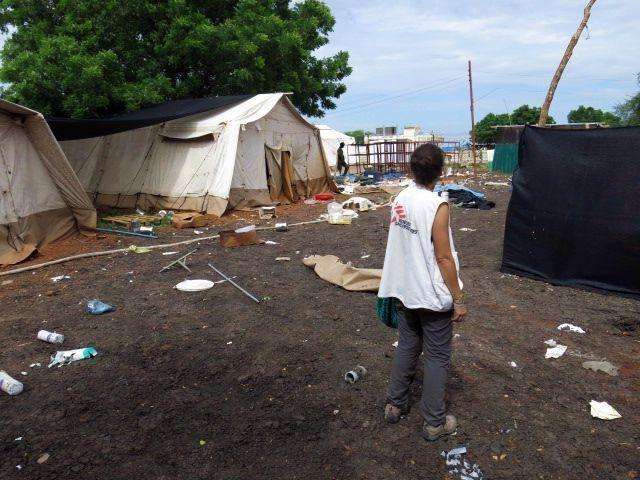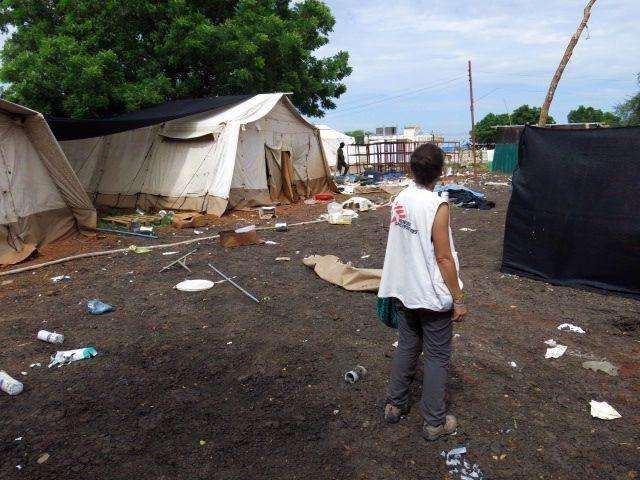Doctors Without Borders/Médecins Sans Frontières (MSF) has resumed activities in Melut, in South Sudan's Upper Nile State, 16 days after renewed fighting forced the organization to suspend medical activities and evacuate staff. However, the ongoing conflict and recurrent periods of shelling in Malakal and Melut are still making it difficult for MSF teams to access the population to provide medical assistance and for populations to access health care facilities.
Suspending medical activities meant that the host population and the 20,000 internally displaced people in Denthoma 1 camp in Melut went without health care during that time. Those living across the Nile in the neighboring Wau Shilluk and Noon areas, which host around 37,000 and 7,000 people respectively, were also cut off from humanitarian assistance. Some patients receiving treatment for diseases including HIV, tuberculosis (TB), and kala azar were forced to interrupt their treatment, which could lead to drug resistance or death.
Facilities Looted and Vandalized
When MSF teams returned to Denthoma 1 camp in Melut, where MSF is running a hospital, for a “flash” visit after a week’s absence, they were shocked to find the hospital, the office, and pharmacies looted and vandalized, causing incalculable losses. Water tanks were riddled with bullet holes and people had been without safe water for three days. This prompted MSF to launch an emergency procedure and to start distributing water purifiers to 4,000 families so they could treat the Nile river water they were collecting and using. MSF has also restored the water purifying system, which supplies the camp with around 120 cubic meters of clean water per day.
At the United Nations's Protection of Civilians site (PoC) in Malakal town, the number of medical consultations continues to increase, with emergency-related consultations rising from 301 in January to 861 in May. Despite heavy shelling and inter-communal clashes in the PoC, MSF continued to provide medical services to the over 30,000 people living there. Treatment is being given to people injured in the inter-communal clashes inside the PoC, as well as to those with diseases like malaria, lower respiratory tract infections, and acute watery diarrhea.
“All MSF wants is to provide health care to the population, regardless of ethnicity, political affiliation, or religion,” said Miroslav Ilic, MSF head of mission in South Sudan. “It is quintessential that people continue to have access to quality, lifesaving medical care. Therefore, it is vital that all parties in the conflict allow for the provision of humanitarian aid and health care to the population.”
High insecurity in the past few weeks has hampered MSF teams’ ability to move across the Nile to provide assistance to people in remote areas of Wau Shilluk and Noon. MSF has been forced to only conduct “flash” medical visits, to attend to urgent medical cases and supply drugs to TB patients to ensure their treatment is not interrupted. Until the security situation stabilizes, the teams cannot conduct activities normally, making life more difficult for these isolated communities.
Logistical Challenges
Administrative hurdles and security constraints constantly make it difficult to deliver humanitarian assistance. Planes cannot land in conflict zones, making it difficult to deliver essential items, including medicines. The impending rainy season will block roads and cause rivers to burst their banks, making transportation to remote areas even more difficult and leaving populations even more vulnerable. It is therefore imperative that the warring parties in these areas prioritize the provision of humanitarian aid to these remote populations during this time of conflict.
More from South Sudan: Civilians Shot in Malakal
MSF is one of the largest medical and humanitarian aid providers in South Sudan with more than 3,500 staff across the country, as well as projects in Ethiopia, Uganda, and Sudan serving South Sudanese refugees. MSF currently operates projects in six of South Sudan’s ten states, including in Unity, Upper Nile, and Jonglei, where the conflict has taken a particularly heavy toll on the population.
MSF also runs activities in the Abyei Administrative Area. Teams are responding to various health needs including surgery, obstetrics, malaria, kala azar, vaccinations against preventable diseases, and malnutrition. MSF calls on all parties to respect medical facilities, to allow aid organizations access to affected communities, and to allow patients to receive medical treatment, irrespective of their origin or ethnicity.





